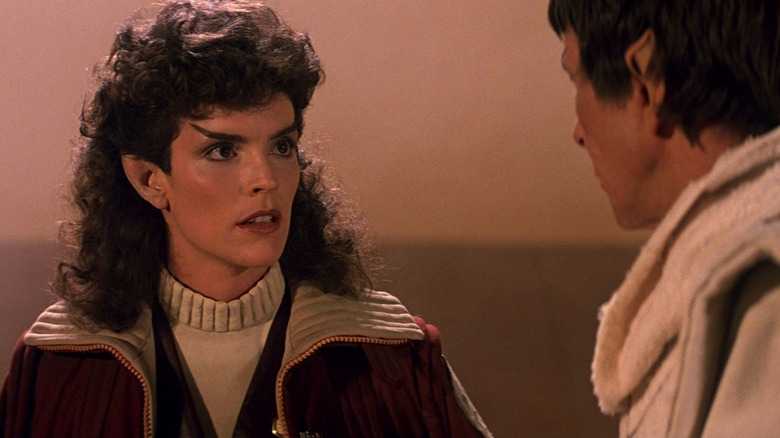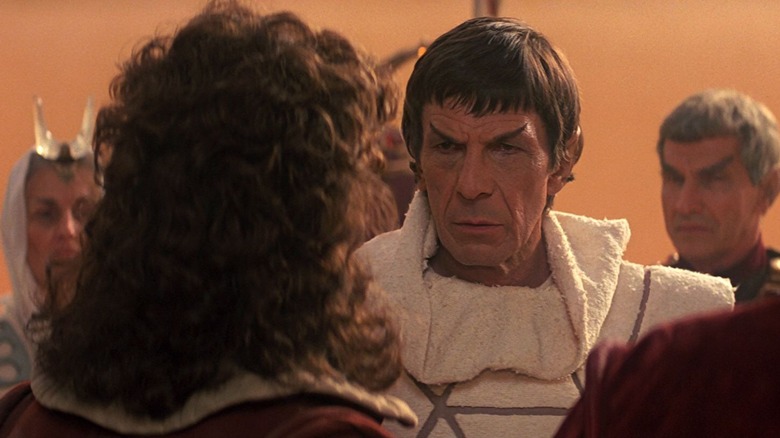The Vulcan Tip Leonard Nimoy Gave To A Star Trek Newcomer In The Search For Spock
Leonard Nimoy's 1984 film "Star Trek III: The Search for Spock" is one of the most significant — and tragic — films in the "Star Trek" franchise. Recall that Spock (Nimoy) died at the end of "Star Trek II: The Wrath of Khan," and that his body was launched onto the surface of the newly-created Genesis planet.
In "The Search for Spock," however, circumstances led Admiral Kirk (William Shatner) to believe that Spock could be resurrected. For one, Spock shunted a copy of his consciousness into the brain of Dr. McCoy (DeForest Kelley) shortly before his death. Also, the Genesis world, given its propensity for hyper-fast evolution, managed to create an infant clone of Spock's body, a fact discovered by Saavik (Robin Curtis) and Kirk's son David (Merritt Butrick). Kirk feels that if he can retrieve the living Spock body and use an oblique Vulcan ritual to reunite Spock's consciousness with it, his friend can be brought back from the dead.
The problem is, Kirk has to sacrifice everything to do this. He attracts the ire of a power-hungry Klingon named Kruge (Christopher Lloyd) who not only murders David in a hostage situation, but also infiltrates the U.S.S. Enterprise, forcing Kirk to blow it up. "Star Trek III" is a tale of what happens when Kirk and co. do something for purely selfish reasons.
Saavik is a key player in "Search," as she is present for David's death, and it was she who kept Spock's body alive during a hostage situation. Curtis hadn't any exposure to "Star Trek" prior to "Search," but knew she would need advice on how to play a Vulcan. Luckily, Nimoy gave her a single piece of direction that helped immensely. Speaking to StarTrek.com in 2024, Curtis said she learned that all Vulcans are imminently wise.
Spock's advice to Saavik
Vulcans, to briefly iterate, are a species of aliens that, many millennia ago, nearly fought themselves to extinction because of their warlike ways. A Messiah figure named Surak, however, suggested that Vulcans pivot their central societal philosophy away from hate and into a form of emotionless logic. Vulcans have endeavored to live by such a code ever since, never expressing their emotions and approaching every issue with pure reason. On "Star Trek," Vulcans have long provided an interesting philosophical counterpoint to the passionate humans they tend to work with, especially when it comes to serving aboard a starship.
Curtis, like most people even passingly familiar with "Star Trek," knew about the behavior of Vulcans from watching Nimoy's performance on the original 1966 TV series. Nimoy was the first actor to play a Vulcan, so he more or less co-invented the species. When Nimoy stepped in to direct "The Search for Spock," he was finally able to communicate to other actors exactly what they needed to play Vulcans. Curtis recalled the direction she received from Nimoy that clarified Vulcans to her, explaining:
"Mr. Nimoy took such a lovely, intuitive approach to directing. He said, 'Vulcans have 1,000 years of wisdom behind the eyes.'"
Which is a savvy piece of advice. Vulcans, it should be added, are very long-lived — they can live over 200 years — and have passed down their logical philosophy for hundreds of generations. There are no "immature" or "impulsive" Vulcans. Curtis did an exemplary job. Regarding Nimoy, Curtis added:
"I look back with such fondness at his sensitivity, his respect for other actors, his ability to orchestrate the existing cast — his fellow co-workers for so many years — and newcomers like myself and Christopher Lloyd."
Sounds lovely.

